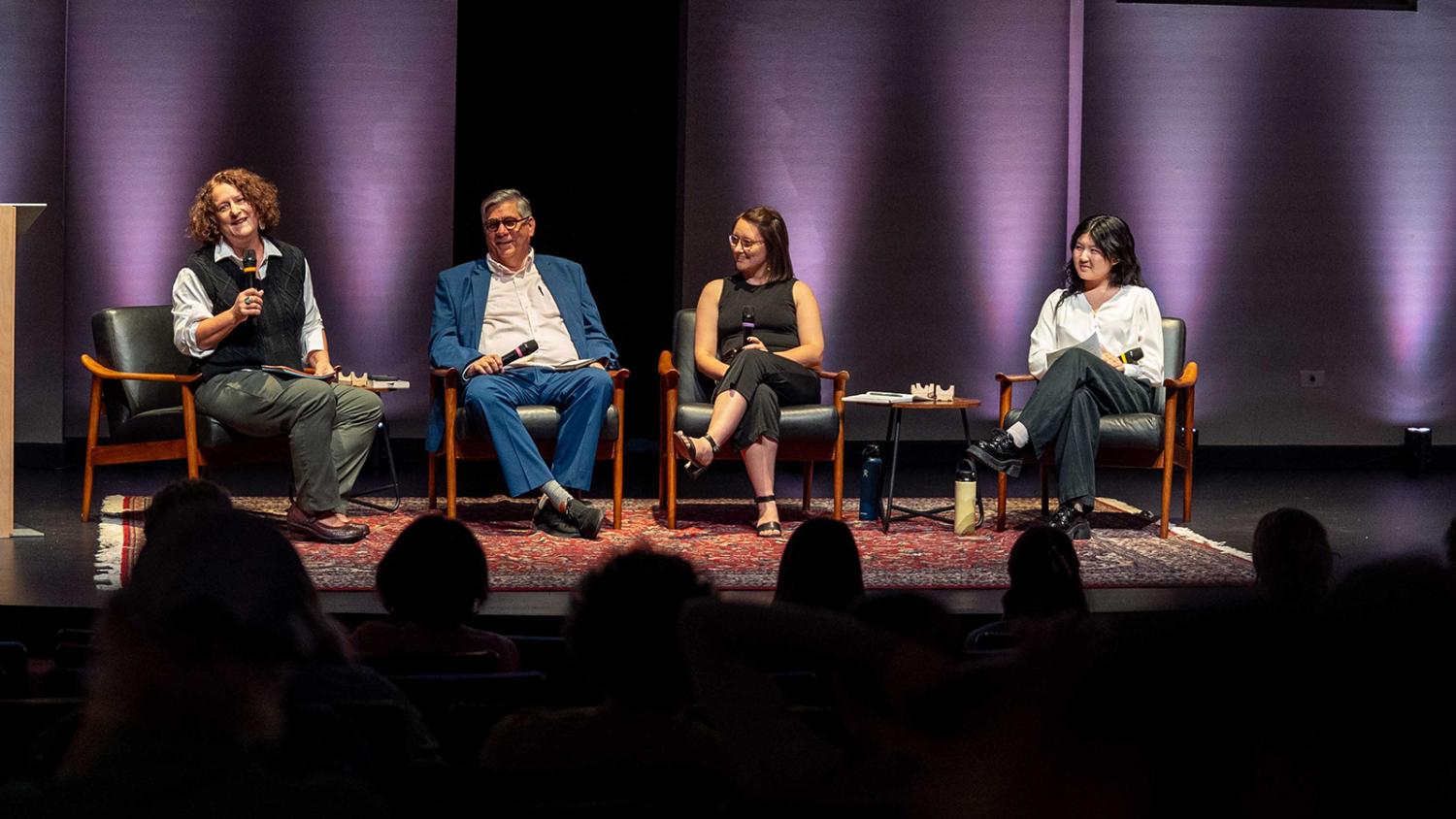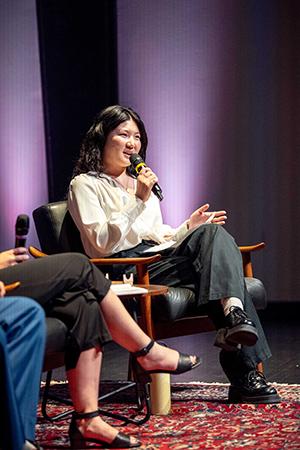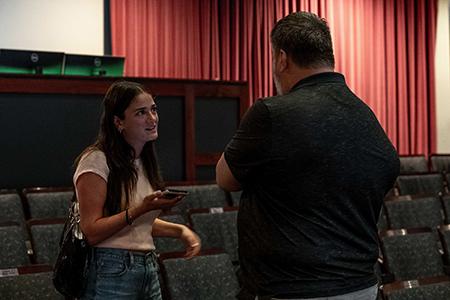Slow your scroll: Experts talk news, TikTok and critical thinking in Poynter panel

Phaedra C. Pezzullo, left, welcomes the audience as she prepares to moderate a panel discussion on journalism at the Boulder Public Library. The other panelists are, from left, Mark Trahant, Amanda Williams and Jade Liu. Photos by Jack Moody.
Much ink has been spilled, airtime spent and pixels devoted to questions around news engagement and the youngest generation.
The Poynter exhibit was just one journalism highlight at CMDI during the fall. On Oct. 1, the college welcomed nearly 1,300 high school students to campus for J-Day, an annual celebration of journalism and media at schools across Colorado.
So, rather than speculate, a panel session earlier this week invited a high school journalist to join seasoned reporters, editors and University of Colorado Boulder faculty to explore intergenerational storytelling and the future of the news media.
It started from the first question that moderator Phaedra C. Pezzullo, a professor of communication and director of the Sustainability and Storytelling Lab at the College of Communication, Media, Design and Information, pitched to Jade Liu.
Pezzullo asked Liu, a senior at Boulder’s Fairview High School, how technology shapes her approach to journalism, especially when telling stories for different generations.
“And you’re going to tell us that Twitter is old news now,” Pezzullo said; Liu drew a lot of laughs when she playfully fired back that “It’s X now, you know.”

“I’m honestly not the most online person, so I don’t know how well I can speak to this,” Liu said. “But years ago, I don’t think anyone was reading the newspaper for eight hours a day—yet today, there are people watching TikTok or scrolling Instagram for that long. When you’re taking in that much information at that rapid of a pace, there’s no stopping to think critically about what you’re seeing.
“I think that the main threat facing journalism today isn’t that it’s going to be replaced, but getting people to really care about it at a time when we’re facing so much information constantly coming at us.”
The panel discussion, which took place Tuesday at the Boulder Public Library, was presented in conjunction with Poynter’s 50th anniversary exhibition, Moments of Truth: An Exploration of Journalism’s Past, Present and Future. This traveling showcase traces journalism’s history, from movable type to A.I.-generated content, and illustrates how the industry has adapted in the face of technical innovation.
“Long before journalism as we know it today took shape, the need to tell our stories and share the truth of the world has been central to the human experience,” said Jessi Hollis McCarthy, a program specialist at MediaWise, the media literacy arm of Poynter. “Across time, we’ve created the tools and techniques we need to communicate the information that shapes our lives. Journalism is a vital part of that tradition.”
CMDI has been honored to be a stop on Poynter’s national tour. The college’s founding dean, Lori Bergen, has been a member of Poynter’s national advisory board and currently serves as a trustee.
“It’s a tremendous privilege to get to bring Poynter’s perspective about news literacy to the university and Boulder communities, especially in a time of hyper-partisanship and ceaseless technical innovation,” Bergen said. “Poynter is personally important to me, and also critical to the work that I do as a journalism educator and a citizen.”
Focus on environmental reporting
In addition to a general discussion of intergenerational storytelling and technology, the panelists spoke specifically about environmental journalism.
Mark Trahant, who has held multiple leadership roles in news, including at SeattlePI and ICT, said the industry is struggling to cover complex, slow-moving environmental crises. He shared stories he’s written about communities on the Taholah River, in Washington, which have been besieged by storm surges and flooding.
One village, Trahant said, has moved itself to higher ground. “But when I went up there with a photographer, we went through 35 villages facing the same lowland situation. Yet none of those communities are going through the same process.

“We have to get people to understand what the big picture is, and then act on it,” he said. “But journalism is not very good on the second part. We can talk about the issues and some of the complexities, but it boils down to policymakers and citizens who have to take the next step and decide what they want to do about it.”
Amanda Williams, a special projects editor for NPR’s 1A, is spending the year at CU Boulder as a Ted Scripps Fellow in Environmental Journalism. She said the news is responsible for giving people resources to take that action without journalists becoming activists.
“At the end of a conversation, we try to end with things you could do or think about, or a place you could go to learn more about what we’re talking about,” Williams said. “It’s important to leave people with a direction to go after your story, your conversation or your podcast, so they don’t feel you were just dumping all these problems on a page and then walking away.”
A lengthy question-and-answer session with the audience followed the discussion. Topics ranged from technology, news disengagement, and the political and legal climate journalists are confronting.
A lighter question came from an audience member who asked whether games like Wordle, Connections and “Wait Wait…Don’t Tell Me!” encourage younger audiences to pay attention to the headlines, in addition to the diversions. Williams credited The New York Times with its boldness in moving into directions like cooking, puzzles and podcasting faster than other outlets.
“I know a lot of people who have New York Times subscriptions because they love the games so much—and making the mini crossword not free anymore probably led to more subscriptions, too,” Liu said. “But I do think the challenge is bridging that gap, and going from playing New York Times games to reading New York Times stories.”
Joe Arney covers research and general news for the college.

